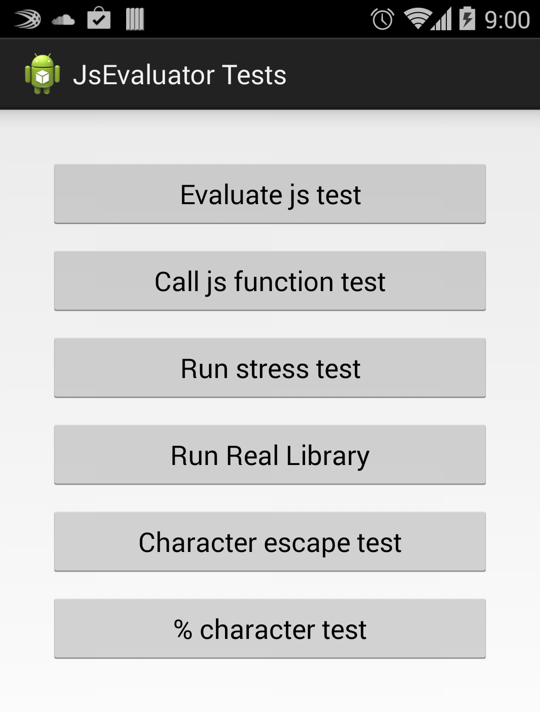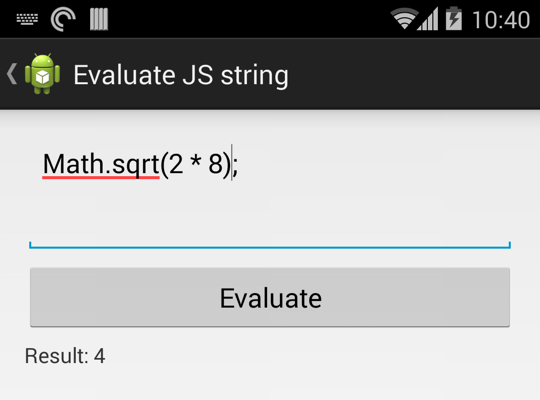JsEvaluator may help you run JavaScript in an Android app and get the results. This is an alternative to evaluateJavascript method of the WebView. Supports Android version 4.0 (Ice Cream Sandwich) and newer.
There are two ways your can add JsEvaluator to your project:
- From a remote Maven repositorty.
- From a local .aar or .jar file.
- Add
maven { url "https://jitpack.io" }into allprojects/repositories section of your project build.gradle file. For example:
allprojects {
repositories {
jcenter()
maven { url "https://jitpack.io" }
}
}- Add
compile 'com.github.evgenyneu:js-evaluator-for-android:v1.0.3'into dependencies section of your module build.gradle file. For example:
dependencies {
compile fileTree(dir: 'libs', include: ['*.jar'])
// Keep you existing dependencies here
compile 'com.github.evgenyneu:js-evaluator-for-android:v1.0.3'
}For less information, see Gradle/Maven setup instructions on JsEvaluator jitpack.io page.
Download jsevaluator-1.0.aar. You can also build it yourself into jsevaluator/build/outputs/aar/ directory in Android Studio with this command:
./gradlew :jsevaluator:aR
To add JsEvaluator to your app in Android Studio:
- Copy the
jsevaluator-1.0.aarto your app/libs folder. - Add
compile(name:'jsevaluator-1.0', ext:'aar')to dependencies block of your module build.gradle file. - Add the following code to the repositories block of your project build.gradle file.
flatDir{
dirs 'libs'
}
- Unzip the
jsevaluator-1.0.aarand get the classes.jar from it. You may want to rename it to jsevaluator.jar. - Open properties for your app project.
- Select
Librariestab inJava Build Path. - Click
Add JARs...button and select the .jar file. - In your project properties click
Order and exporttab. - Tick the .jar file.
Create evaluator instance:
JsEvaluator jsEvaluator = new JsEvaluator(this);this is a reference to your activity.
jsEvaluator.evaluate("2 * 17", new JsCallback() {
@Override
public void onResult(final String result) {
// Process result here.
// This method is called in the UI thread.
}
});Note: make sure to call evaluate method in UI thread.
jsEvaluator.callFunction("function myFunction(a, b, c, a) { return 'result'; }",
new JsCallback() {
@Override
public void onResult(final String result) {
// Process result here.
// This method is called in the UI thread.
}
}, "myFunction", "parameter 1", "parameter 2", 912, 101.3);Any number of string, int or double parameters can be supplied.
Note: make sure to call callFunction method in UI thread.
JavaScript is evaluated asynchronously without blocking UI thread. Result is returned in the UI thread. It is required to call evaluate and callFunction in UI thread.
Each time the JavaScript is evaluated in the new context. It can not access the result of a previous evaluation. Please concatenate all your JavaScript to one string and evaluate it in one go.
For example, if you need to load jQuery libary and then use it:
String jQuery = "/*! jQuery JavaScript Library v2.1.1 ...";
jsEvaluator.evaluate(jQuery + "; $.isNumeric(123)", new JsCallback() { ...Behind the scenes it creates a WebView and feeds it JavaScript code for evaluation:
mWebView = new WebView(context);
String javascript = "<script>myObj.returnResult('Hello World')</script>";
String base64 = Base64.encodeToString(data, Base64.DEFAULT);
mWebView.loadUrl("data:text/html;charset=utf-8;base64," + base64);The result of evaluation is sent back into Android activity:
public class JavaScriptInterface {
public void returnResult(String result) {
// result from JavaScript
}
}
mWebView.addJavascriptInterface(new JavaScriptInterface(), "myObj");Tests are located in app module of this project. The app can be run for manual testing as well.
Or run as Android JUnit Test for unit testing.
Android versions tested:
- 4.0.3 (Ice Cream Sandwich)
- 4.1.2, 4.2.2, 4.3 (Jelly Bean)
- 4.4.2 (KitKat)
- 5.0, 5.1 (Lollipop)
- 6.0 Android (Marshmallow)
If you have any issues or need help please do not hesitate to create an issue ticket.


